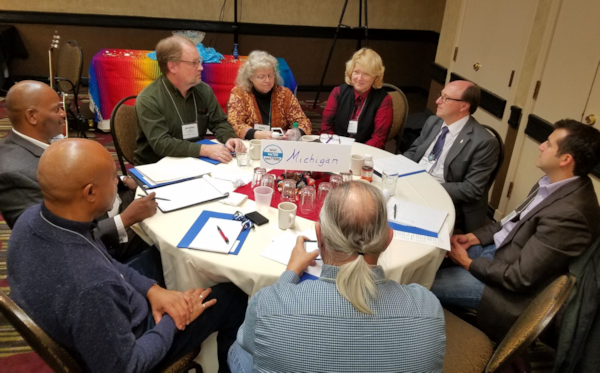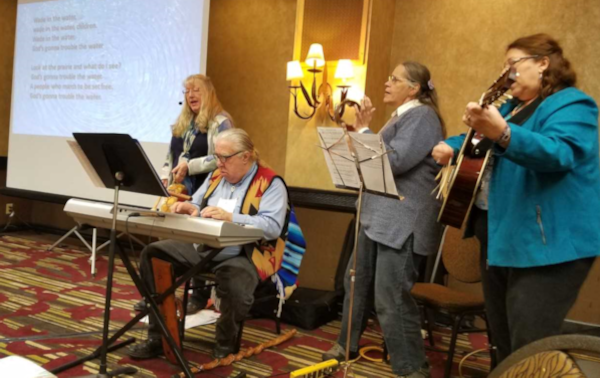New hope and community were spirit-generated at the recent Why Water Matters Summit in Minneapolis.
KARLA HOVDE
Minnesota Annual Conference
Over 100 people from across the United States, including leaders from Native American communities, environmental scientists, and activists, gathered in Minneapolis in mid-November for a three-day Why Water Matters Summit focused on the importance of advocating for and protecting water.
The attendees, most of whom are connected to the United Methodist Church, came together to learn, organize, and celebrate. The Minnesota Annual Conference facilitated the event on behalf of the North Central Jurisdiction of the UMC. Minnesota was chosen to host because the state contains the headwaters of the Mississippi River.

The event featured workshops, resources, and leadership from Native American and United Methodist perspectives. Speakers provided a theological foundation for environmental action and encouraged attendees to become aware of the relationship between racism and environmental degradation. Individuals were empowered to create action plans for water advocacy and sustainability in their communities.
The Why Water Matters Summit was planned by Native American clergy and laity in response to the crisis at Standing Rock and the continuing need for education and action for water justice.
Lionel Little Eagle Pinn, one of the keynote speakers of the three-day summit, was impressed by the way the attendees shared achievements and built collaborative teams to work toward the same goals. “We often hear ‘let’s fix stuff,’ but here they are giving us real tools to make change” for water advocacy.
Though he is not a United Methodists, he was impressed by the way the UMC Book of Resolutions makes the church’s position clear on environmental sustainability, protection of water, and justice. The fact that three bishops participated in the summit impressed on him the importance the church pays to these issues. Bishop Bruce R. Ough of the Dakotas-Minnesota Area, Bishop Sally Dyck of Northern Illinois Annual Conference, and Bishop David Bard of the Michigan Area all participated in the gathering.

Rev. Dr. Jerry DeVine, Director of Connectional Ministry for the Detroit Conference of the UMC, was struck by how the gathering brought together people who otherwise would have never been in the same place together. At one table, a traditional pipe carrier, a United Methodist bishop, a social justice staff person and deacon, a pastor of a Native American United Methodist Church, an environmental facilities engineer, a UMC global agency staff person, and a water crisis response coordinator all sat together. “The common bond was a deep care for creation and specifically for safe and accessible water,” said DeVine. “We had artists interacting with activists, Christian leaders with Indigenous Traditional leaders, and passionate young adults with wise elders.”
Representatives from UMCOR, UM Earth Keepers, UNESCO Water Project, and a variety of other United Methodist agencies, national and international environmentalist groups, and Native American organizations approached the issues surrounding water protection from diverse viewpoints, urging protection of water with theological, social, or scientific standpoints.
In his keynote message, Dr. Randy Woodley, a professor at Portland Seminary, a legal descendent of the United Keetoowah Band of Cherokee of Oklahoma, and an ordained clergy of the American Baptist Church, reminded all that creation care is essential to a Christian life. The scripture makes it clear that God made creation and God loves creation. If we want to be disciples, then we can’t mistreat that which God created and called good.

The summit also included worship services and sacred ceremonies. One evening, a Water Walker, Singing Wolf Sharon Day, held a water walker ceremony for all attendees. Day used sage, tobacco, and water to guide participants in a service to respect water, which has a living spirit in her culture.
The Why Water Matters Summit was also a time to experience the social elements of a Native American gathering. Gift giving is one important tradition. “People are not judged by what they own, but by what they share,” said Eliida Lakota, who made traditional Horse Sticks made of driftwood, leather, beads, feathers, and fur to give to all the speakers at the conference. Many participants brought gifts to place on a give-away blanket, and all participants received a gift when they left. The summit also included time for oral storytelling, Native flute playing, and working on handicrafts. The sense of pride in Native Americans’ art, history, and culture was evident in every aspect of the event.
DeVine concluded that the Why Water Matters Summit was a holy and renewing experience for all. “The planning team, while doing an incredible job, could not have created the transformation that took place. God’s Spirit was moving in our midst as we gathered, weaving a new hope and a new community.”
Last Updated on September 20, 2022

